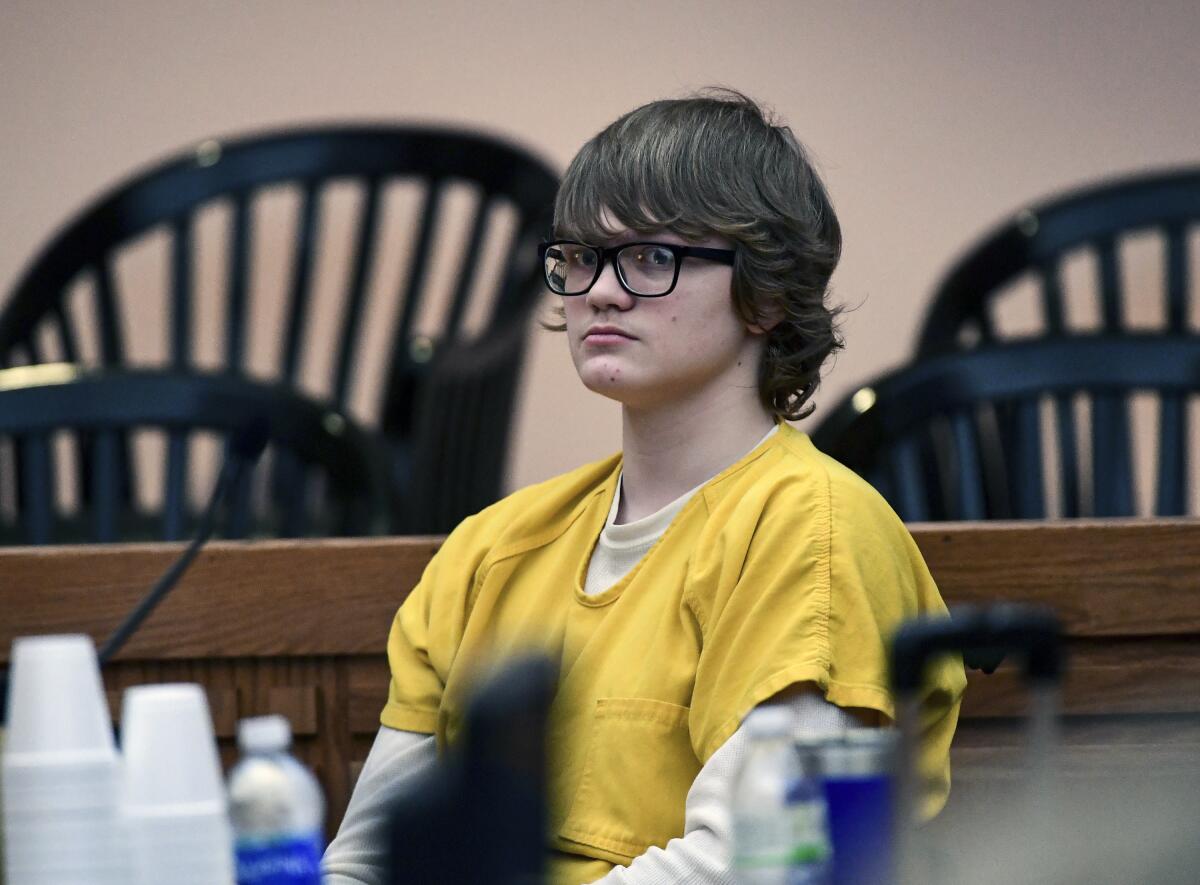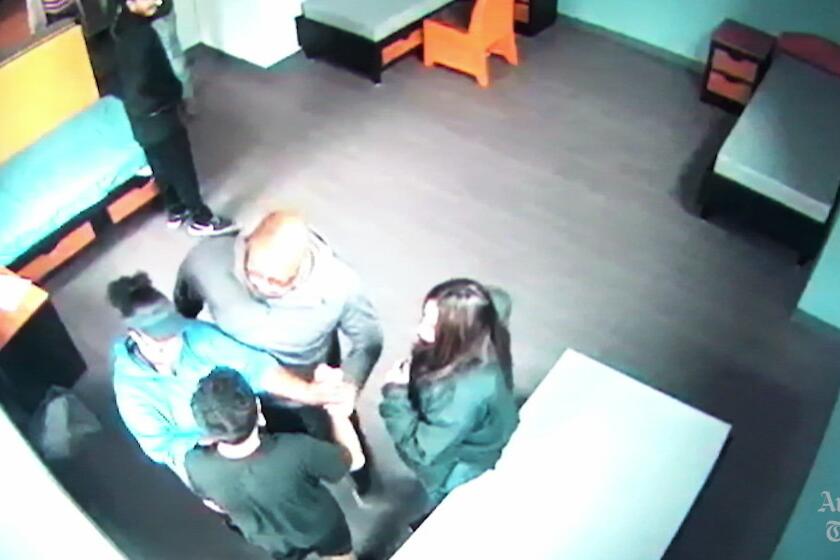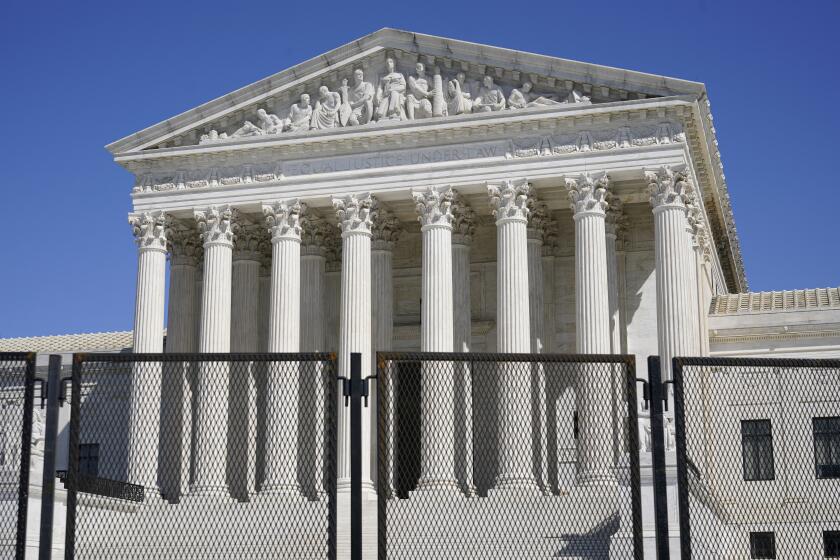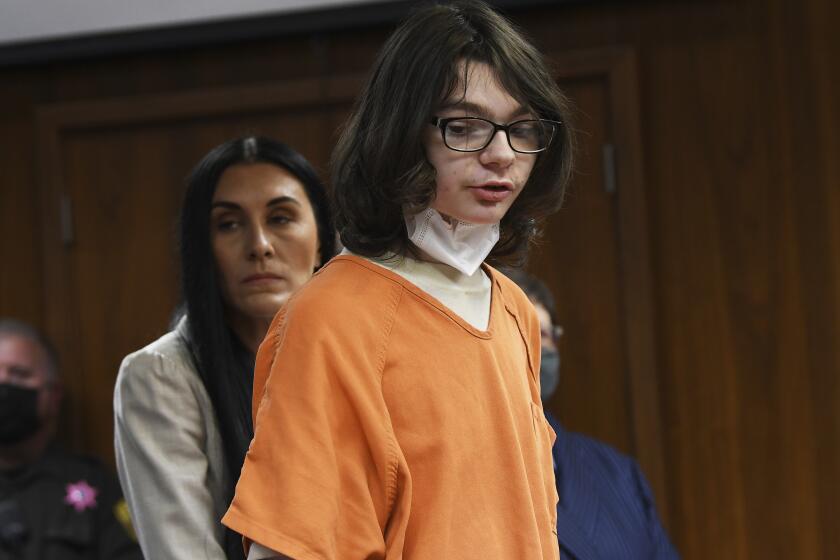Column: Should a 14-year-old school shooter spend his whole life in prison — or be eligible for parole?

On Sept. 28, 2016, in Townville, S.C., 14-year-old Jesse Osborne shot his father to death with a .40-caliber pistol while he slept. Then, after kissing his rabbit and other pets goodbye, Osborne drove to the Townville Elementary School, went to the playground and began shooting at a group of first-graders celebrating a classmate’s birthday.
He killed Jacob Hall, who was 6 years old. He injured two other students and a teacher. He had planned to kill dozens more, but his gun jammed.
A judge ruled that Osborne should be tried as an adult. He pleaded guilty in 2019 and was sentenced to life in prison without the possibility of parole.
Opinion Columnist
Nicholas Goldberg
Nicholas Goldberg served 11 years as editor of the editorial page and is a former editor of the Op-Ed page and Sunday Opinion section.
But this week, Osborne’s lawyer, Frank Eppes, was back in court, asking that Osborne’s sentence be reconsidered. Eppes says the judge didn’t fully take into account a psychologist’s report that concluded Osborne was a victim of abuse and that he could, in fact, be rehabilitated. Eppes said the court should give Osborne “some hope to live with.”
But does Osborne deserve hope? Does a killer who committed such an awful act deserve our mercy? The mere suggestion raises profound questions about the purpose of incarceration, the role of punishment, the possibility of rehabilitation and the proper limits of compassion — and how those concepts apply to murderers who were children when they committed their crimes.
Osborne is hardly a sympathetic figure. He was methodical, planning the attack in advance and studying other school shootings. In a video from the day of the attack, he can be seen combing his hair and narrating: “Got to have your hair straight when you’re going to shoot up a place. Got to look fabulous.”
He took a 6-year-old boy away from his family forever.
The prosecutor in the case, explaining why he’d sought life without parole for a teenager, was blunt: “He did a horrible thing and he’s a horrible person.”
Editorial: No, crime survivors don’t need prosecutors at parole hearings. But they do need more help
Prosecutors who claim to represent crime survivors at parole hearings are actually representing themselves. Sheriff’s personnel have even less place.
But the fact remains that Osborne was still a child when his crime was committed. Not a 6-year-old like Jacob, and not an innocent like Jacob. But Osborne was only 14. It’s true he did a horrible thing and it may also turn out that he’s an irredeemably horrible person, but in my view, the system needs to consider the possibility that he’s still growing, changing and maturing, and he could become something other than horrible over the coming decades.
U.S. Supreme Court Justice Elena Kagan wrote that juveniles are characterized by “transient rashness, proclivity for risk, and inability to assess consequences.” Former Justice Anthony M. Kennedy wrote: “Children are constitutionally different from adults in their level of culpability.”
I called Eppes, Osborne’s lawyer, to hear his version.
“Why do kids commit crimes like murder?” he asked. “They don’t do it because they’re inherently evil. They don’t do it because they’re incorrigible and unsalvageable. Most children who kill do it because they’re young and stupid and impulsive, and they don’t have the sense God gave a turnip until they’re about 25 years old.”
The L.A. County D.A.’s office has launched a criminal investigation into the behavior of probation officers who dogpiled a 17-year-old boy in video first revealed by The Times.
It’s easy for the court to impose and stick to the longest possible sentence. That’s safe, satisfying and morally straightforward. As Eppes points out, South Carolina is “Old Testament country.”
And there’s nothing unusual about treating child defendants harshly. English common law going back centuries allowed for the conviction and punishment of 7- to 14-year-olds as long as they seemed to understand the difference between right and wrong. Children as young as 10 were put to death in 18th century England.
But the world is changing. Psychologists and neurologists agree that minors are less capable of making mature moral judgments than adults and more capable of being rehabilitated.
Today, the U.S. is the only country that allows sentences of life without parole for crimes committed before age 18, according to the Sentencing Project. And more than half of U.S. states prohibit such sentences.
The Supreme Court, too, has been moving on the issue, slowly.
With liberals dissenting, the Supreme Court makes it easier for juveniles convicted of murder to get life in prison without parole.
In 1988, the court prohibited the death penalty for offenders whose crimes were committed before age 15, deeming it “cruel and unusual.” In 2005, the justices raised that bar to 18. Then the court said juveniles could not be sentenced to life without parole for any crime other than homicide. Then it banned automatic life sentences without parole for juveniles who killed someone. In 2016, it applied that retroactively to thousands of inmates.
That last ruling came in the case of Henry Montgomery, who was imprisoned in 1963 for shooting and killing a sheriff’s deputy when he was 17. Sentenced to life without parole, he served 58 years in Louisiana penitentiaries. Finally, after decades in court, he was released at age 75 for a crime he committed when he was “young, wild and stupid,” as he put it.
The problem with life without parole for juveniles is that you just can’t be sure how 17-year-old Henry Montgomery will have changed by the time he’s 75. Nor can you know whether the 14-year-old killer Jesse Osborne will be a different person when he’s 60.
Unfortunately, parole is not permitted for people convicted of murder in South Carolina. So the Anderson County judge’s only alternative is to shorten Osborne’s sentence.
Prosecutors will seek a sentence of life without parole for a teenager who killed four fellow students at a Michigan school and pleaded guilty.
A better solution would be for the Supreme Court to finally and unequivocally declare life without the possibility of parole for juveniles unconstitutional in a ruling that would affect Osborne’s case and others around the country.
It might also affect the case of Ethan Crumbley, who killed four fellow students at Oxford High School in Michigan in 2021 when he was only 15. Crumbley’s sentencing is scheduled for June 2 and prosecutors are seeking a sentence of life without parole.
Juvenile killers don’t necessarily deserve shorter sentences. But they deserve reconsideration over time. Are they still dangerous? Have they shown remorse? Have they learned empathy, kept a clean record, matured, grown?
Jacob Hall’s family, unsurprisingly, wants Osborne to stay in prison without parole, prosecutors said. I understand that.
But sentencing decisions aren’t solely designed to satisfy victims’ families. They’re designed to achieve justice, which is a complicated and elusive concept but one that includes fairness and a measure of compassion even for the most heinous killers.
More to Read
A cure for the common opinion
Get thought-provoking perspectives with our weekly newsletter.
You may occasionally receive promotional content from the Los Angeles Times.















